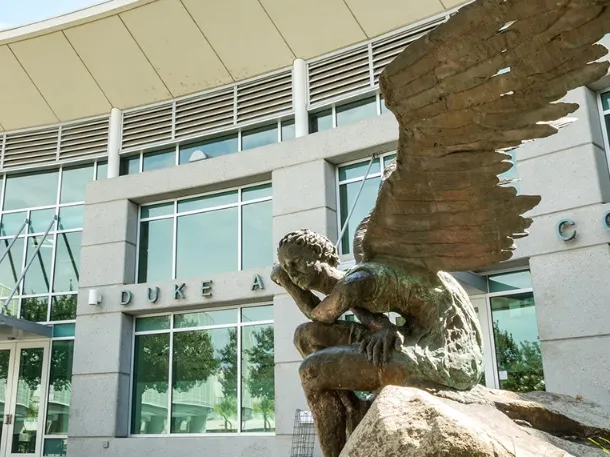- Home
- >
- APU Articles
- >
- News Article
What I Learned from the Old Testament about Embracing Disruption - Articles
June 05, 2020 | Written By Joseph Bentz, PhD

People keep saying this crisis is unprecedented, and in some ways that’s true, but in a larger sense, disruption is always lurking in the background, even in the calmest periods of our lives. As this mess has unfolded, I happen to have been researching a book on the cultural influence of the Old Testament, a follow-up to my book, 12 New Testament Passages that Changed the World.
If you want to find disruption, open almost any page in the Old Testament, and there it is. Every major figure I have written about had their lives thrown into chaos, usually when God was about to do his most important work through them. For all of them, disruption was not something they had to overcome. It was something they had to embrace. If they refused to do so, they never could have stepped into the roles they are known for, the roles they were born for. Ruth and Naomi, David, Abraham and Sarah, Moses, Noah, and others all had to come to terms with their lives being thrown into disarray.
A common pattern emerges among these biblical figures whose lives God chooses to disrupt:
-
Disorientation. Nobody wants disruption. Like us, the heroes of the Bible try to avoid chaos. They would prefer a smooth, easygoing life, just as we would. So at first, when the unwanted interruption to the status quo emerges, they fight it. Moses is minding his own business, tending his sheep, when God shows up in the burning bush. Moses doesn’t want to confront Pharaoh. He doesn’t want to lead the Hebrews to the Promised Land. He doesn’t want the hassles, the setbacks, the disobedience of his people, the blame, the moments of terror. Noah doesn’t want to build an ark. Jonah doesn’t want to go to Nineveh to preach. They want to be left alone. They want to follow their old routines.
-
Acceptance of God’s Challenge. For the biblical figures I have studied, the breakthrough comes once they decide to stop limiting themselves to their own ideas about who they are and instead trust God to lead them. God tells Moses, “I will be with you” (Exodus 3:12), and after some questions and pushback, Moses finally believes it. Jonah is a little harder to convince. He has to be tossed into the sea and spend three days in the belly of a great fish that God prepares before he is ready to be vomited onto dry land and obey God’s command. Naomi has to overcome bitterness, which she has assumed as part of her identity, in order to trust the God she believed was actively working against her. God doesn’t force any of them to change their minds and trust him, but he doesn’t move his purpose forward in them until they do.
-
Embrace of a new role and identity. Trust has to be accompanied by action. Moses steps out to confront Pharaoh. Abraham moves to a new land. Jonah has to preach. Naomi has to put a plan in motion for Ruth to reach out to Boaz. Noah has to build. Once they obey, none of these people are ever the same. They don’t obey God and then simply go back to life as they knew it before the disruption. They are forever changed, and so is the world in which they acted.
Today, as our own routines and expectations are toppled by forces beyond our control, the lives of these biblical figures can offer some guidance. What can we do in the midst of our own chaos?
-
Give ourselves time to mourn the losses. Just as the Old Testament figures were allowed time for disorientation, we should also realize that this is a time of loss. We should acknowledge it, cry out to God, and accept we can’t make sense of everything right away.
-
Go easy on ourselves and others. In my own social media feeds lately, I have noticed a decline in the number of guilt-inducing posts about things like Shakespeare writing King Lear during the plague, and an increase in posts about taking care of ourselves, not demanding too much in the moment.
-
Trust God and move forward. None of us chose this. Our only choice is who we trust to get us through it. For some, just surviving will be a victory. For others, new opportunities, even a new identity, may arise before this is over. What might be possible for each of us to do and become that would never have happened during “normal” times? How might we be stretched beyond what we thought were our “limits”? God may not want us to be the same people after this as we are right now. Will we hear him and obey?
Bentz will be featured on the Parker J Cole call-in radio show on Sat., June 13, at 11 a.m. to discuss the topic of disruption. Listen live or to the podcast.
*This article was orginally published by The Foundry Community on May 21, 2020.